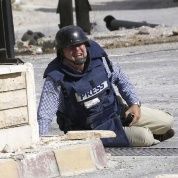A new manual detailing the protocol for soldiers in combat has declared that journalists can now be targeted legitimately as non-civilians by U.S. armed forces, in updated language used by a new war manual released by the U.S. Department of Defense earlier this month.

The passage raising eyebrows says, “In general, journalists are civilians. However, journalists may be members of the armed forces, persons authorized to accompany the armed forces, or unprivileged belligerents.”
The classification of journalists as “unprivileged belligerents” is leading experts to conclude that the U.S. Department of Defense has given the green light for soldiers to kill journalists.
The 1,176-page Law of War Manual — the first comprehensive conduct guide for all branches of the U.S. armed forces since 1956 — was released earlier in June and included a critical change in military terminology, abandoning the term “unlawful enemy combatant” and replacing it with “unprivileged belligerents.”
The previous term, “unlawful enemy combatant,” caused a storm of controversy after its introduction by the Bush administration shortly after the events of Sept. 11, 2001.
The U.S. Department of Justice, along with White House legal advisers, determined that the United States did not need to treat detainees captured during their “war on terrorism” with the same regard or protections given to “prisoners of war” as defined by the Geneva convention.
It was this legal interpretation that allowed for the creation of the notorious Guantanamo Bay prison, where prisoners were not afforded the rights normally provided under the Geneva convention, where prisoners are subject to indefinite detention and military courts instead of a civilian courts.
The classification of journalists as potential “unprivileged belligerents” has raised fears that the U.S. armed forces, frequently criticized for its use of targeted assassinations, will view the language in the new manual as authorization to assassinate journalists.
“It gives them license to attack or even murder journalists that they don’t particularly like but aren’t on the other side,” Georgetown journalism professor Chris Chambers told RT.
Army Lt. Col. Joseph R. Sowers, a Pentagon spokesman, told the Washington Times, “That last sentence simply reflects that, in certain cases, persons who act as journalists may be members of the armed forces, persons authorized to accompany the armed forces or unprivileged belligerents rather than civilians. The fact that a person is a journalist does not prevent that person from becoming an unprivileged belligerent.”
Sowers also said that journalists who are members of non-state armed groups “would continue to be unprivileged belligerents notwithstanding their work as journalists.”
However, states have often classified journalists as members of illegal organizations as a means of suppressing dissent in the press and the new protocols established by the U.S. Department of Defense could set a dangerous precedent in the world.
Colombian journalist Joaquin Perez Becerra, director of the Anncol news agency, was detained in 2011 on the orders of the Colombian government for allegedly having links to the Revolutionary Armed Forces of Colombia, known as the FARC. He was released in July, 2014 after a court absolved him of the charges.
“It was a judicial show prepared by the governments of Alvaro Uribe and Juan Manuel Santos with the intention of silencing journalists and fighters for truth and change in Colombia," said Perez's lawyer, Rodolfo Rios.
Another Colombian journalist, William Parra, was also targeted for alleged links with the FARC. He too was cleared when the attorney general of Colombia closed the investigation in March, 2015.
Colombia, which also conducts targeted assassinations, could have conceivably gone after both Becerra and Parra had they operated under similar rules outlined in the Law of War Manual. Former Colombian President Alvaro Uribe has often accused journalists he dislikes of being “servants of terrorism.”
Al Jazeera Arabic journalist Ahmed Mansour was detained for three days this month in Germany at the request of Egyptian authorities. Mansour, who was released without charge, was convicted in absentia by an Egyptian court of torturing a lawyer and was sentenced to 15 years in prison. He insists the accusations are false and that he has no connection to the Muslim Brotherhood, an organization deemed illegal by Egypt.
U.S. officials have also been know to take decisions based on bad or unreliable intelligence. Canadian citizen Maher Arar was famously detained in the United States based on suspicions he was a member of al-Qaida. Arar was subsequently deported to Syria, where he was tortured, upon the orders of Attorney General John Ashcroft's former deputy, Larry Thompson. Syria eventually exonerated Arar and he returned to Canada.
A 1977 addendum to the Geneva convention states clearly that “journalists engaged in dangerous professional missions in areas of armed conflict shall be considered as civilians” and are considered protected under the convention “provided that they take no action adversely affecting their status as civilians.”
According to professor Chris Chambers actions that would affect their status as civilians would require these journalists to participate in combat activities or “provide material help” to the armed group. Chambers told RT that he sees no proof whatsoever that combatants masquerading as journalists is a pressing concern.
The preface of the Law of War Manual also specifies that it “has benefited significantly from the participation of experts from the Department of State, Office of the Legal Adviser, and the Department of Justice, Office of Legal Counsel... the views in this manual do not necessarily reflect the views of those Departments or the U.S. Government as a whole.”